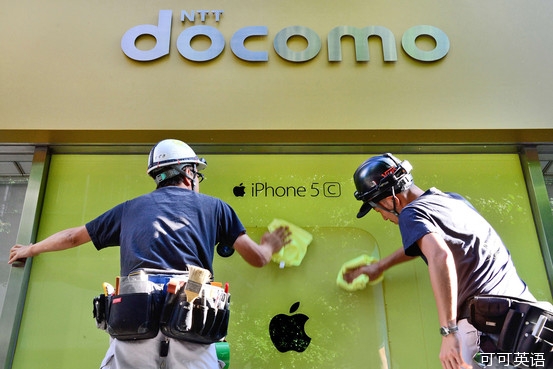
Apple Inc. is striking gold in an unlikely place: Japan.
苹果公司(Apple Inc.)正在一个不大可能取得成功的市场高歌猛进,那就是日本。
In the past two years, Japan has emerged as Apple's fastest-growing region, far outpacing its home market and the booming economies of Greater China and the rest of Asia. Japan is also home to Apple's biggest profit margins, and the only one of Apple's five regions where operating profit grew in the past fiscal year.
过去两年,日本已成为苹果增长最快的市场,苹果在日本的增速超过了在其本土市场和大中华等亚洲日益繁荣的经济体的增速。日本还是苹果取得最大利润率的市场,并且是苹果的五大市场中唯一一个在上一财政年度实现营业利润增长的市场。
That is surprising because Japan isn't most companies' idea of a growth market. It has labored through two decades of economic malaise, and is saddled with a shrinking, aging population. Moreover, domestic firms that pride themselves on consumer electronics have kept foreign competitors at bay for decades.
这一情况令人意外,因为日本并不是多数企业的理想增长市场。日本已经经历了长达二十年的经济不景气时期,并且面临人口萎缩和老龄化问题。此外数十年来以消费电子产品自傲的日本公司在日本市场一直遥遥领先于海外竞争者。
The iPhone has propelled Apple's success in Japan, supported by heavy marketing and rich subsidies from telephone companies. The iPhone's cachet taps Japan's fervor for brand-name goods, similar to how Japanese shoppers once flocked to Louis Vuitton bags and Burberry scarves.
苹果在日本取得的成功主要受iPhone推动,大规模营销措施以及电话公司提供的丰厚补贴支持了iPhone在日本的销售。iPhone的名气迎合了日本人对品牌的热衷,就像日本购物者曾追逐路易威登(Louis Vuitton)的手袋和巴宝莉(Burberry)的围巾一样。
'Apple's brand is just overwhelming here,' said Eiji Mori, a Tokyo-based analyst at BCN Inc. 'It's not about specifications. It's not about rationale. It's about owning an iPhone.'
BCN Inc.驻东京的分析师Eiji Mori说,苹果品牌在日本已经势不可挡,这与产品规格无关,而在于对拥有一部iPhone的渴望。
Sales got another boost in late September when NTT DoCoMo Inc., Japan's largest wireless carrier, began offering the iPhone for the first time to its 61.8 million customers. Even before that, the iPhone was Japan's best-selling smartphone, with a 37% market share in the six months ended Sept. 30, according to Tokyo's MM Research Institute. That's comparable to the iPhone's 36% share in the U.S. in the third quarter, according to Kantar Worldpanel ComTech.
9月末iPhone销量获得进一步提振,因为日本最大的无线运营商NTT移动通讯(NTT DoCoMo Inc.)首次开始向其6,180万客户出售iPhone。据东京的MM Research Institute称,即便在那之前,iPhone就已经成为日本最畅销的智能手机,截至9月30日的六个月iPhone在日本的市场份额已达37%。据Kantar Worldpanel ComTech的数据,iPhone第三季度在美国的市场份额为36%。
Apple's iPad also garnered more than 50% of Japan's tablet-computer market in the fiscal year ended March 2013, said MM Research.
MM Research称,在截至2013年3月份的财年,苹果的iPad在日本平板电脑市场的市场份额已超过50%。
As the last major Japanese operator to offer the iPhone, DoCoMo is aggressively discounting new models to lure users from competitors, while offering incentives to entice existing subscribers to switch from other phones.
NTT移动通讯是最后一家参与出售iPhone的日本主要运营商,该公司正在大举进行新款iPhone的促销,以期从竞争对手手中抢夺用户,该公司同时推出了吸引现有用户以iPhone取代其他手机的促销措施。
According to Strategy Analytics, Japan was the world's fourth-largest smartphone market in the first quarter of 2013, ranking behind China, the U.S. and India. As of the end of September, there were 50.15 million smartphone subscribers in Japan, said MM Research.
据Strategy Analytics称,2013年第一季度日本是全球第四大智能手机市场,排在中国、美国和印度之后。据MM Research称,截至9月底,日本有5,015万智能手机用户。
Two factors in the iPhone's Japanese success are Japan's wealth and the degree to which its phone market resembles the U.S., a 'postpaid' market where the phones are subsidized by carriers and sold with multiyear contracts. 'The U.S. and Japan are unique in that sense,' says Sanford C. Bernstein & Co. analyst Toni Sacconaghi.
iPhone在日本的成功是由两大因素促成的:日本人的富裕程度以及其手机市场与美国手机市场的相似程度(两者均为后付费市场,运营商为手机提供补贴,并且所售手机附带多年合约)。Sanford C. Bernstein & Co.的分析师萨科纳吉(Toni Sacconaghi)说,这是美国和日本市场的独特之处。
In markets where most consumers pay for the handset upfront, the iPhone's big price tag damps sales.
在多数消费者要预先付费来购买手机的市场,iPhone的昂贵价格抑制了销售。
In China, the world's largest smartphone market,Apple's newest phones, the iPhone 5C and 5S, are roughly twice as expensive than what most consumers pay for a homegrown alternative with a larger screen. Research firm Canalys said Apple ranked fifth in China's smartphone market in the most recent quarter.
在全球最大的智能手机市场中国,苹果新款手机iPhone 5C和iPhone 5S售价约为多数消费者购买的屏幕更大的本土品牌智能手机价格的两倍。研究公司Canalys称,在最近一个季度,苹果在中国智能手机市场排名第五。
Apple could get a lift if China Mobile Ltd., the country's largest carrier, starts to roll out iPhones on its network. The Wall Street Journal had reported in September that the company was preparing to ship the handsets to the operator.
如果中国最大的运营商中国移动有限公司(China Mobile Ltd., 简称:中国移动)开始销售接入其网络的iPhone,苹果在中国的销售可能会获得提振。《华尔街日报》(The Wall Street Journal)曾在9月份报道称,苹果正准备向中国移动发货。
One unique factor in Japan is the relatively small presence of Samsung Electronics Co., the world's largest smartphone maker. Samsung ranks fourth in Japan behind Apple, Sony and Sharp Corp., in part because of a Japanese consumer bias that works against many Korean brands.
日本市场的一个独特之处是,全球最大智能手机制造商三星电子(Samsung Electronics Co.)的市场份额相对较小。三星在日本市场排名第四,位于苹果、索尼和夏普公司(Sharp Co.)之后,这在一定程度上是因为日本消费者具有对许多韩国品牌不利的偏见。
Apple also is benefiting from the struggles of Japan's electronics conglomerates. NEC Corp. pulled the plug on its smartphone business earlier this year, while Panasonic said in September that it plans to stop producing smartphones for mainstream consumers.
日本电子行业巨头的困局也令苹果受益。日本电气公司(NEC Corporation)在今年早些时候结束了该公司的智能手机业务,松下电器产业公司(Panasonic co.)则在9月份表示,计划停止生产针对主流消费者的智能手机。
Apple's sales in Japan grew 27% to $13.5 billion in the fiscal year ended Sept. 28, compared with increases of 12.8% and 4.1% in China and the rest of Asia Pacific, respectively. Revenue growth was hampered by a weaker yen that diminishes sales when converted into U.S. dollars. In the preceding fiscal year, Japan outpaced the other regions with a 94% increase in sales.
截至9月28日的财年苹果在日本的销量增长27%,至135亿美元,同期苹果在中国和亚太其他地区的销量分别增长12.8%和4.1%。苹果在日本的收入增长因日元贬值受到抑制,日元贬值令苹果转换成美元的销售额缩水。在此前财年,苹果在日本的销量增长94%,增速超过了其他地区。
Japan is also the most profitable market for Apple with operating profit margins exceeding 50%, compared with 35% in the rest of the world.
日本还是苹果最有利可图的市场,苹果在日本市场的营业利润率超过50%,高于其在全球其他地区35%的营业利润率。












